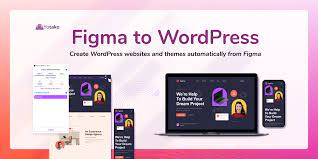🎁 Exclusive Discount Just for You!
Today only: Get 30% OFF this course. Use code MYDEAL30 at checkout. Don’t miss out!
“This course is available and delivery within a few hours!”
Making simple changes or global alterations becomes much easier once you’ve agreed on the final design, making it a reality using your WordPress design tools of choice is so much easier.
Learn From Figma To WordPress

Design Faster, Work More Efficiently & Make More Money!
The From Figma to WordPress course is here to help you become more efficient by taking your design process from inefficient tools or your page builder of choice and moving to a rapid design platform – Figma!
Helping YOU Design Faster
From Figma to WordPress is focused on helping you learn how to design websites using the incredibly popular Figma prototyping tool & transition your designs to WordPress using Elementor, Bricks Builder or GenerateBlocks.
Design Faster
Spend less time fighting with the wrong tools like your page builder or Gutenberg and use a dedicated design and prototyping tool like Figma.
Once you’ve worked through the initial module to gain a solid understanding of the fundamentals of Figma, you’ll soon be up and running creating amazing-looking designs with minimal effort.
Smooth Collaboration
Smooth collaboration is the key to a streamlined workflow and using tools like Figma can help guarantee that your workflow is seamless, and helps your clients become a part of the whole process.
Making simple changes or global alterations becomes much easier once you’ve agreed on the final design, making it a reality using your WordPress design tools of choice is so much easier.
From Design To Reality
Learn how to design with the end result at the forefront of the process. Taking your design visions to a fully realised and interactive end result has never been easier.
Learn the process I use to achieve this and immediately add your new-found skills to your workflow. You’ll love the flexibility and your clients will love the ease with which you realise their visions.
Here’s what each module covers
Module 1: Figma Design
This first module focuses on covering the basics of working in Figma. You’ll learn how to set up your artboard, add frames, configure your colours, configure your typography, set up your 8-point grid, and create reusable components to speed up your design process. Once you’ve learnt the basics of working with Figma, I’ll take you through the complete design process, focusing on building a one-page design for a UI/UX designer.
By the time you’ve worked your way through the entire process of building the design, we’ll be using for each of the next modules, you’ll have a solid understanding of not only the fundamental tools and skills needed but also some awesome time-saving ones too.
Module 2: Building The Design With Elementor
In this module, you’ll learn how to take the design created in the first module in Figma and rebuild it using the popular WordPress page builder, Elementor. You’ll learn how to speed up your workflow and design process using global styling.
For ongoing compatibility, you’ll be using the new Elementor Container widget to work with the most flexible and future-proof techniques. This will entail working with the Flexbox method of building the final design and using a very similar toolset to the other modules in the course.
This module will then focus on each of the sections of the landing page in its own dedicated lesson and will finally wrap up by ensuring the final design is mobile responsive.
Module 3: Building The Design With GeneratePress & GenerateBlocks
In this module, you’ll learn how to take the design created in the first module in Figma using Gutenberg. We’ll be using the popular GeneratePress & GenerateBlocks theme and block builder to provide an easy-to-use and flexible platform.
You could easily substitute this combo for most other modern WordPress themes and block plugins and achieve the same results. The main aim is to give you a streamlined, fast-loading suite of tools to build the final mobile responsive design.
Module 4: Building The Design With Bricks Builder
This module focuses on taking the Figma design and building it using Bricks Builder for WordPress. You’ll benefit from using global styling and other methods of making your design process smooth and streamlined.
The final stage will be ensuring that the design is fully mobile responsive.
—————
“NOTE: The content above has been rewritten by our library.”
“To read more original content please visit here. ”
Course Features
- Lectures 0
- Quizzes 0
- Duration 10 weeks
- Skill level All levels
- Language English
- Students 58
- Assessments Yes
